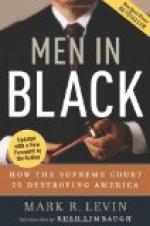Cases are cited where the rich woman returning from a debauch of European shopping with a few thousand dollars’ worth of pearls sewed in the lining of her winter bonnet is only fined, whereas the little milliner from the lower end of the city is sent to jail for trying to smuggle in a new coat. The impressario of art collections is caught at a gigantic scheme for defrauding the government of thousands of dollars on imported pictures. He hobbles into court and on the ground of ill health escapes a prison sentence and is merely fined, while the little Italian fruit vender is summarily jailed for bringing in a few dried mushrooms. The high financier who wrecks a railroad or a bank serves a light prison term and emerges like a phoenix to buy new steamboat lines or float new enterprises. But the peddler on the East Side who sells a few dollars’ worth of stale fish is punished to the limit of the law.
The facts exist and to the popular mind seem unexplainable. There undoubtedly must be a reason, and what it is, is not hard to find. It seems one of the mysteries of judging and of justice, as though there were an unwritten law in the back of the human mind in favor of property rights. There is an explanation and not an inequality of justice. The facts are not as they are popularly stated or supposed to be. The public gets only a portion of the picture, and from an enormous group of cases, a few contrasted ones are picked out for the sake of the dramatic effect. The limelight of public notice is upon them and the softer lights and shadows are omitted. The public does not see the gradation. On the one hand we see the rich woman, the millionaire art dealer, the financial pirate being leniently dealt with, on the other hand we see the little milliner, the Italian fruit vender, and the peddler receiving harsh sentences.
The sharp contrasts make good newspaper stories that are appealing and touching. What the public does not see is the whole picture of all the cases of alleged inequality that come into court. These are only six out of seven hundred cases, chosen because they are melodramatic. There were nearly seven hundred other offenders that were let off with suspended sentences or light fines, of whom nothing is heard, but these three are conspicuous on account of their wealth, and the cases of the milliner, the mushroom vender, and the peddler are reported for the same reason—of being conspicuous. They are unusual on account of the sentences. The harshness of their sentences is remarkable. There may be special reasons. The six hundred and ninety-odd who are punished lightly in the same way as the rich man are not noticed.




